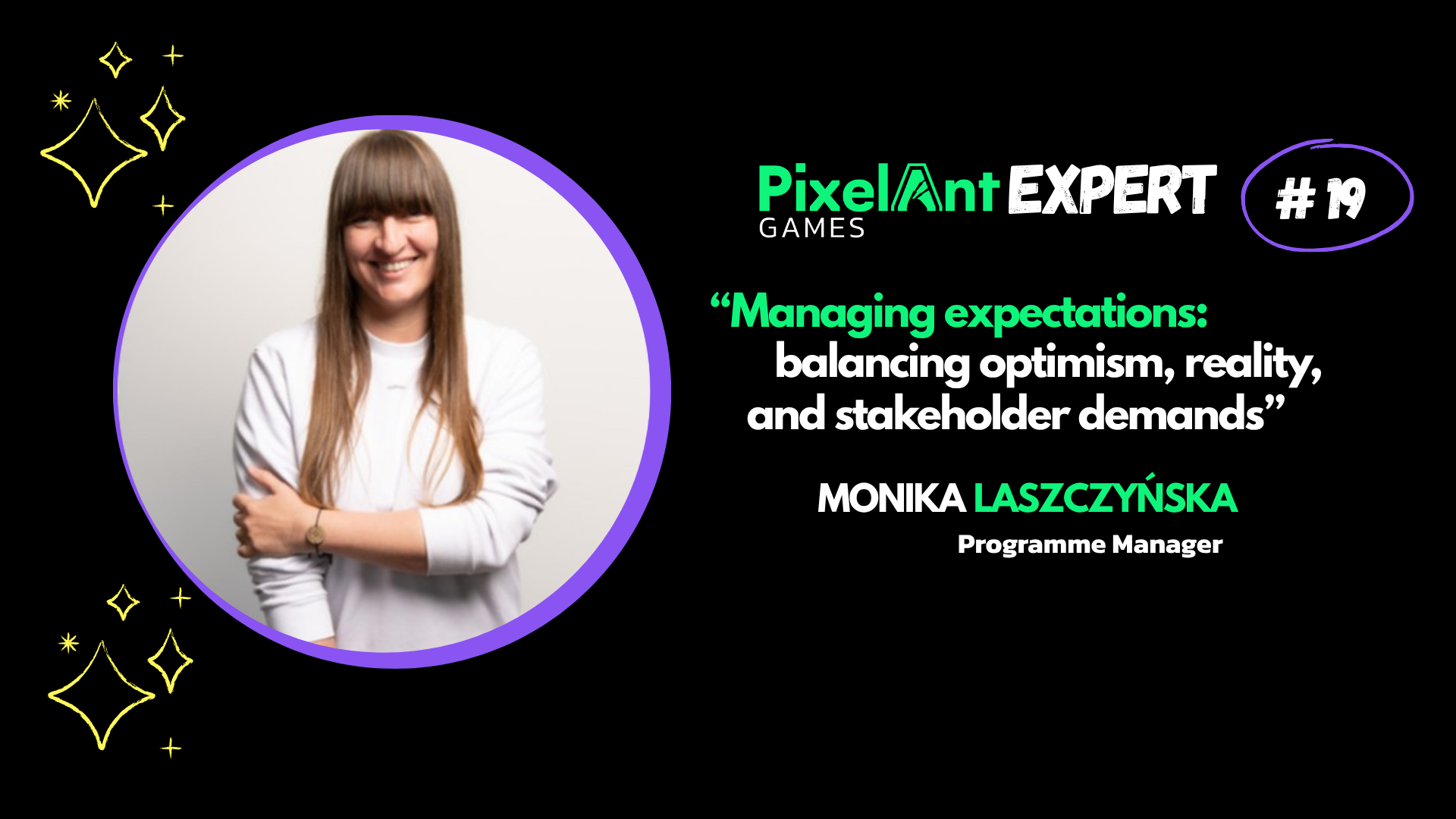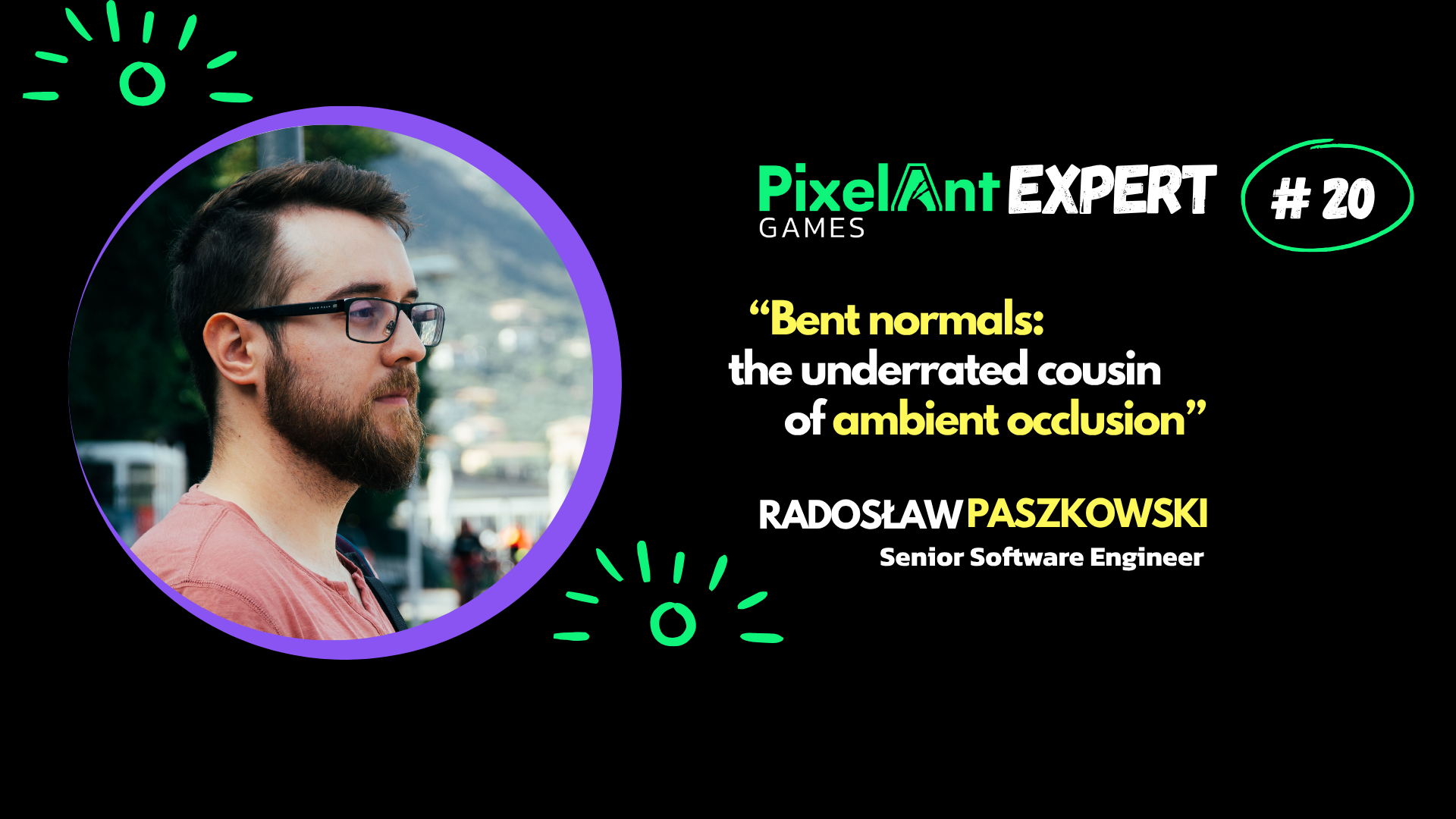
How can a multi-project environment reinvigorate your programming career
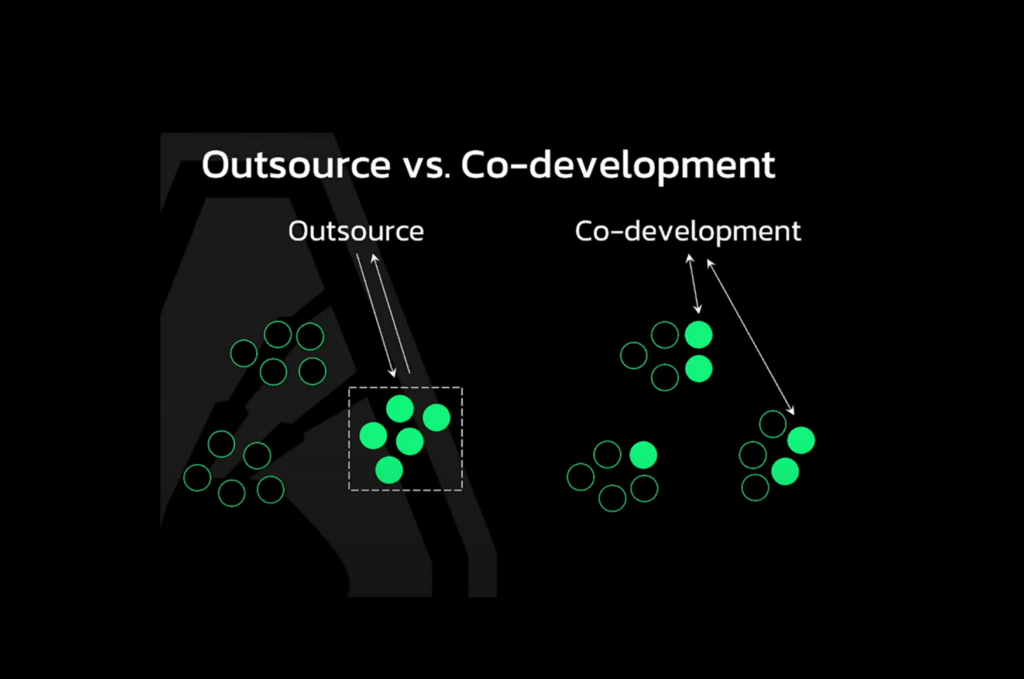
At PixelAnt Games, we have created a learning-oriented culture to unstick employees’ programming careers. As we want to share our knowledge, we would like to tell you a bit about how we approached the problem, and in the end, let go of all the frustration.
However, do keep in mind that this isn’t an off-the-shelf, ready to implement quick fix or quick hack on how to instantly resolve your programming or game development career. We believe that to really do it, you need to start functioning within a learning-oriented culture which leads to professional development.
ROOT CAUSE OF BEING STUCK: DEVELOPMENT MODELS
The development models behind the majority of game development studios might be the root cause of finding yourself stuck in a rut.
The most common model is own-IP development – meaning that the studio and teams have been working on in-house games for many years. Whether it’s AA or AAA game, it takes years to finish such projects.
From a business perspective, it’s very wise to make a sequel if the project is successful, but it might be the root cause of feeling stuck.
The second model is an outsourcing company – it’s kind of a software house, where the work is being subcontracted to you or your team, where you have the ability and access to work on different titles. In this scenario you don’t feel committed to one project, but it can be the situation where you cannot learn, you just do the work.
You’re not meeting with people from the client’s side a lot, and you’re not part of the client’s team, you’re just supposed to deliver a part of the project.
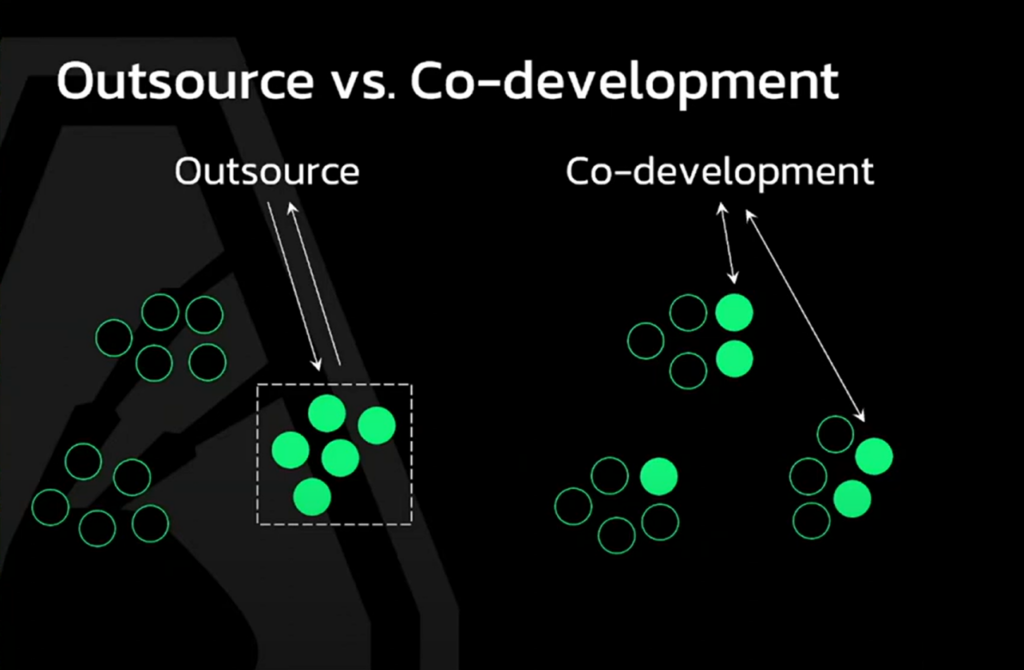
And then there’s co-development, where you develop a game together, in close cooperation with another studio/s. Here you work with the client closely, you can be a part of their team, learn much more and be an important part of the bigger picture.
CO-DEVELOPMENT AS A WAY TO BECOME UNSTUCK
Taking all that into account, we started crafting a company culture in PixelAnt Games. Since the very beginning, we knew that we wanted to create a culture focused on growth and self-development.
Our business model is based on two stable pillars. The first leg is co-development – that’s why we decided to join Sumo Digital: to have access to all the partners and great AA+/AAA games. In co-development type of work, we can learn from teams very often way more experienced than us.
On the other hand, we would like to leverage those experiences, gather them, and use the know-how to create our own IP, in our own way.
That’s our way to get game developers unstuck in terms of professional growth, and to bring the fun back into game dev. We consider “keep on growing yourself and your skills” our key value, and we really put a lot of attention into that.
We choose projects very carefully, based on what we want to learn, and we choose clients based on how we want to build a relationship. Growing is part of our strategy, and we believe that it is the true source of motivation.
In the long run, motivation leads to quality. That’s the key ingredient for our secret sauce recipe for making high quality games.
Sumo Digital has so far co-developed more than 100 games of every genre, on every platform, with every technology. As of today, we support several projects which we chose very carefully.
We can choose to be part of teams that consist of 30 people or 150 people. We choose the projects we want, work with any technology required, utilize various tools, work with different teams.
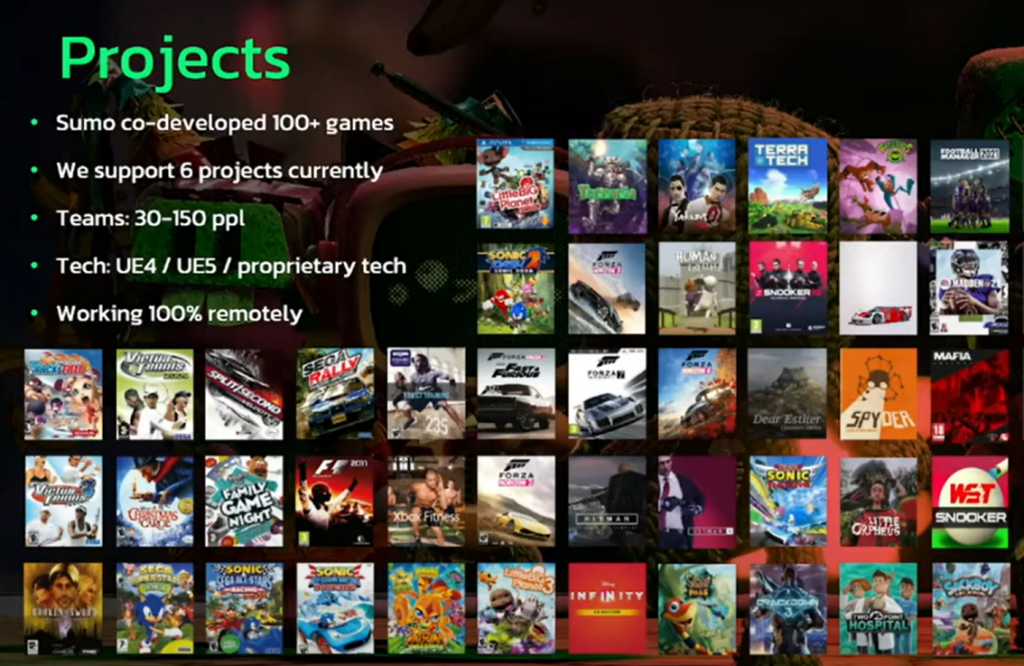
We want to learn from that and benefit from those experiences as much as we can, using them while working with our own IP that we’ve already started developing.
We’re working 100% remotely, and this has opened a lot of doors in terms of co-development. Other studios and clients took on the opportunity of working with remote teams, and now we have access to a whole lot of game titles.
We can work on Forza Horizon, Control, Fall Guys, Call of Duty or Sackboy, all while being based in Poland.
REASONS FOR BEING STUCK AND HOW WE HANDLE THEM
In your professional career development, there are a couple of reasons for being stuck – fortunately, at PixelAnt Games, we have solutions:
- Being assigned to one project/franchise for many years – If you spend a couple of years working on one title, you’re certainly gaining know-how and knowledge, but it is not good for the professional growth of an engineer or a game developer.
Solution: At PixelAnt Games, we don’t have that problem as we have access to many projects. Right now, at Sumo Digital there are like 40 projects in development and 80 more projects waiting to be developed.
We can choose between those, and we pick them very carefully based on what we want to learn and what we want to achieve.
- Fixed tech stack – It’s a very rare situation when companies are switching tech stack from one project to another. Once you make a choice, you’re probably going to stick to it.
Solution: At PixelAnt Games, we can choose between different engines and technologies in terms of networking, but also in terms of game development engines – whether it’s a proprietary one, Unreal Engine or Unity. There are many options that we can choose and learn from.
- Fixed processes and rituals – It’s also a rare situation when a company or a single development studio goes from Waterfall to Agile or vice versa. It’s likely that for a long period of time you will be doing things in a similar way, with similar people, within a similar meeting structure, etc.
Solution: At PixelAnt Games we can, for example, learn from clients how they’re doing the Agile implementation or learn from publishers how to do the gating process for own IP creation.
- Owning a specific area/specialization – If, as an engineer, you “touch” just one line of code, you become the owner of the system or this area of code. That’s a habit that can be very hard to get out of it.
Solution: From an engineering standpoint, you don’t have to be the owner of a specific area, you can get out of a specialization if you want to. We have a lot of situations where, for example, a Network Engineer would like to stay in the network and explore his expertise – who has 5-7 projects to choose from.
Again, if he decides to check how the gameplay creation or development looks like, he has several different projects where he can work on the gameplay side, for example, on how the TPP camera implementation should look like in Unreal Engine. This is possible since we have big and complex titles in our list that we can choose from, so there’s always an opportunity to get out of a specialization and try working in other areas, if that’s something you want to do in terms of professional growth.
- Lack of interesting projects – If the project you are working on is not interesting, you might become stuck, and it may be hard in a single company to get out of it. Also, you can’t benefit from it or learn from it.
Solution: We’re working on some franchises that we started playing 20 years ago as well as brand-new titles. It’s an amazing opportunity to choose from projects that are such interesting for us.
We’ve been playing these games for many years and right now, we can co-develop them, so it’s a great opportunity.
- Lack of experts around – after spending a couple of years in the same studio, you’re becoming an expert in a specific field. This might be a situation where you feel you are the smartest person in the room and if that’s the case – congratulations – but alas you don’t have anybody around you can learn from, so it’s not an ideal situation from a professional growth perspective.
Solution: We are not the smartest people in the room anymore – even though on the board of PixelAnt Games we have a lot of developers with 15-20 years of experience, we can learn from people with 30-35 years of experience working across Sumo Group.
This is an amazing opportunity to learn how to do business, how to build the organization, and how to co-develop the AA/AAA projects with the biggest partners.
- Inefficient resource allocation – There is often the case in the game development process when you need to switch to the task which is required by the project (for example once the project is close to being finished, you need to work on performance, on submission processes, etc.), so if you don’t have any more options (in terms of moving to different projects), you must do something that you might not be willing to do.
Solution: We are not bound to the project – we can switch every 3-6 months, or maybe two years if the project is interesting, but we don’t have to stay within the project just to fulfil the resource allocation.
- Studios hire for projects, not culture – Hiring for culture means that you’re building a sustainable organization that can develop itself many years into the future. Hiring for projects, on the other hand, is a rather more short-term view.
Solution: Last, but not least, the most important thing is that we’re hiring for culture. If we hire for culture and there is a fit and alignment on values, we’ll find a project for you, because we have many of them.
A CASE STUDY
I am Piotr Kościuk, Senior Software Engineer and I’m working on a Sumo Sheffield project built on proprietary technology. The team consists of about 150 people, of which there are about 60 programmers, most of them are core studio employees.
I’m working on an arcade, first-person perspective game based on one of the best-known licenses. I’m one of five PixelAnt Games employees involved in this project, and I would love to say more about it, but unfortunately, it has not yet been announced. Stay tuned – it’s worth it!
What does it mean for an engineer to be work in co-development?
- To be part of the team
What is most important for me in co-development is that I’m a part of the team – I’m not just a contractor whose only job is to deliver a requested piece of software.
- To work on an exciting project and on projects aligned to our culture
At the very beginning, my lead from Sumo asked me what my interests were and if I found a particular part of the engine interesting. Currently, I’m working on the animation system and I’m responsible for how the new animation blending system works.
It’s a junction of rendering and simulation layers, and I work closely with many industry veterans in those fields, which is a truly inspiring environment.
- To have an impact on the project
After completing my first tasks, other team members added me to all relevant code reviews and architecture discussions, where I could present my ideas (which are often implemented). I work with producers, tech directors, and other software developers.
I take part in all project meetings, including code catch-ups, where I can learn about how Sumo technology works, ask why specific coding decisions were made, and pick up the very best practices from people who have spent their whole lives in the gaming industry. Besides technical meetings, there are also casual catchups twice a week, where I can hang out with the project team.
- To learn from the experts
When I asked my colleagues what they think about co-development, I heard it’s like regular remote work – I think that describes it quite well. However, what’s worth remembering is that PixelAnt Games chooses projects very carefully.
We want to learn from projects, not be frustrated because of them. For example, I was pleasantly surprised by the documentation quality in the projects I am working on.
I’ve joined at quite a busy time, in a milestone week, and I was directed to the documentation, where I could find everything, I needed – from how to download the game project, how to build it, to things like how the animation system works. We would like to keep such a high level of documentation while working on our own IP.
Potential risks for the studio identity
At this point you may say “OK, this sounds great, but what about being part of PixelAnt Games?” – well this is an excellent question!
I know it looks like I’m being sent to Sumo Sheffield to work on their projects, while other colleagues are working on different projects, so do we identify with PixelAnt Games, or are we just heads for hire?
It’s easy to lose company identity and become just another software house, especially when people are spread across six or 10 projects. In the end, most of our time is spent on development and meetings with other team members.
Our games are top AA+/AAA titles, so everyone can find a match that meets their expectations. One of my colleagues even said that he likes his project so much, that he doesn’t want to change it even for working on our own IP.
Fortunately, everyone is aware of the risks and a lot of effort has been made so that PixelAnt Games is something more than just a company that assigns you to a project and that pays your wages. First of all, everyone at the company knows that they are part of something bigger than the current games.
We have regular meetings such as company updates, where we can see the bigger picture and be informed on the plans for company growth, possible new business opportunities, and plans for the future. We have an open-door policy, so everyone can comment, ask questions, and voice their concerns if a subject needs more discussion.
We organize additional calls to discuss different points of views on a given matter, and we always try to find the best solution and everyone’s input is heard. Besides company updates every week, every employee has one-to-one meetings with their manager to discuss projects or company issues and personal development.
HR update meetings are an excellent example of how transparency works in the company – it is a great opportunity to learn and discuss HR-related topics like types of employment policies, charity events that the company will support or additional trainings. When we started to discuss the company structure, we had a training session with external experts to learn how to manage projects, effectively avoiding potential common problems and pitfalls.
Besides that, we have online “coffee” meetings twice a week, which with the motto “no working allowed” are great place to hang out with colleagues and talk about any subjects that come to mind. We also have lightning talks where everyone can share interesting (in their opinion) subjects – both technical and non-technical – for instance people can discuss their experiences from projects like Unreal Engine functionalities that work well for a given game feature.
We also had presentations about how to start investing money, work more effectively, memorize things more easily and many more. All talks are recorded and are available to all employees – it’s a great repository of knowledge.
What PixelAnt Games offers to their employees is a real game-changer. During my first one-to-one meeting, I was asked if I like my project or if I would like to change it. I really do like my project and find it exciting and challenging, but some colleagues change their projects and it’s fine because this way each of us works on things that make us tick.
As we all know a motivated employee is an effective employee and one of our key values is constant learning. In my one-to-one meetings, I discuss my future plans. Even though I currently work on the animation system, I can choose freely what I will be doing in the future and that may be rendering on networking – I’m not bound to any specialty unless I want to be.
Monotony at work is a terrible thing and it’s not only a game developer’s problem. You can work in a great company, but if you get stuck in one system and get bored of it, you will probably change your job sooner or later.
Here we’ve got five learning days per year, and I can choose any subject I would like to learn during those days. I can stay offline without any emails or instant messaging, staying focused and getting the most out of this day.
In addition to all that, each employee has unlimited free Udemy access which makes it even easier to master new topics and opens many exciting paths for personal development.”
A WRAP-UP OF HOW TO BECOME UNSTUCK
- You need a learning-focused culture to truly get unstuck
As mentioned, there is no easy fix or quick hack to truly unstick your professional growth. We believe that the studio leadership needs to focus on fostering a learning-focused culture to truly reinvigorate and nurture the business setup around professional growth.
- Co-development drives a culture of learning
Co-development might be one of the solutions and can drive a culture of learning because of different projects, different clients, and being part of a team as opposed to workings as an outsourcer. It’s a great opportunity to set up a business that encourages learning from others who are more experienced and who bring great knowledge and experience to the table. Our studio greatly benefits from such an approach and is the future of our own IP development.
- More projects than developers
We are in a position when we have more projects than developers, so we can choose what we want to learn and what we want to have fun with. It’s a great opportunity for us to really bring the fun back into game development. We really love developing the games that we’ve been playing for many years so far, and we also can broaden our horizons in terms of trying different areas to see what is interesting for you.
- Learn from industry experts & top-notch partners
Here you can learn from industry experts and partners and see different rituals, structures, meeting structures, risks etc. We can cherry-pick the best practices and tips for our own IP development.
Also, we can explore exciting new things in action to see whether it’s suitable or not for the type of work that we would like to do in the future in terms of our own IP. We can meet new people from the client’s side, the partner’s side, or the Sumo’s side to learn from each other and share experiences.
We also can choose between all genres, technologies, or platforms. We keep focusing on taking high profile projects, but of course there is a possibility to be a part of a smaller project to see how the tech works there and how we can benefit from it in our own IP development.
- The pandemic opened up opportunities for co-development
Relocation is not needed anymore to work on top-tier titles. We can set up the team here in Poland and work worldwide. Clients have opened to that kind of collaboration as well, so it’s another opportunity to work on the best possible titles out there.
- Great way to gear up for our own IP
To sum up all our setup and experiences – that’s our way of getting our secret sauce and our own IP. Learning from others will bring us closer to the ideal way of creating our own title.
- Many projects mean challenges for studio identity
On the other hand, many projects in the studio mean challenges for studio identity. We might be treated as a gaming software house, so we need to put a lot of attention into really sharing the knowledge and values within PixelAnt Games to build a cohesive studio identity.
We organize a lot of different meetings and in different forms, we do a lot to be one team. Of course, our own IP will help that and at some point, we’ll be building our identity around it. Nevertheless, we want co-development to stay with us for a long time, because it’s a part of our long-term strategy.
- We hire for culture, not projects
Finally – the advice I can give to any studio: hire for culture, not projects. Projects have very limited scope and short-term requirements. In terms of your professional growth, you should be focusing on companies who hire for culture, because if the culture allows you to learn, to grow and move between areas and projects, that’s the very place you want to be.
WATCH VIDEO:
